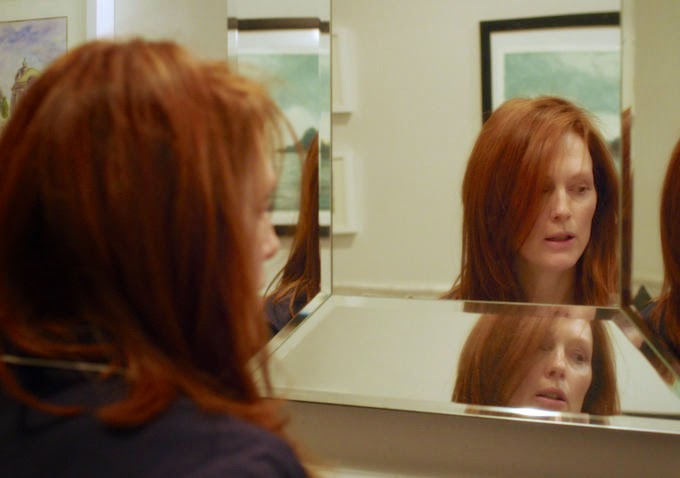No other disease breaks a person down quite like Alzheimer’s. It doesn't destroy the body, but devastates the mind. It causes a person to no longer be themselves. Everything they did; gone. Everything they hope to achieve; gone. Movies about disease tend to focus on the deterioration of the physical form and the impact that has on a person's loved ones, and we've seen those movies done to death and generally following the same emotional beats. So a film like Still Alice, which stars Julianne Moore as a woman afflicted with Alzheimer's, should feel different because the toll the disease takes is different, and yet it's only notable because the lead performance is so good.
Not that it should come as a shock to learn Moore is the best thing about Still Alice; she tends to be the best thing about most of the films she stars in. Other than a competent turn by co-star Kristen Stewart, Moore is really the only thing of note. Certainly co-writers/directors Richard Glatzer and Wash Westmoreland are more enamored with how she depicts her regressing condition than the impact it has on the people around her. Adapted from Lisa Genova's novel, the film centers on the titular woman, who happens to be a brilliant, highly-intellectual linguistics professor. This is a convenient switch from the novel (in which she's a psychologist), one that will allow her reduced faculties to be especially heartbreaking as she struggles to remember simple words. But that comes later; at first Alice seems to have everything a person could want. Her husband John (Alec Baldwin) is an equally brilliant scientist, while their children are just as set for future greatness. Their son Tom (Hunter Parrish) is a medical student; eldest daughter Anna (Kate Bosworth) is a married lawyer; and Lydia (Stewart) is building an acting career. At first, Alice notices only small things slipping her mind. She forgets her keys, has trouble playing Words with Friends, but when she starts getting lost in the city streets she knows something is wrong. Then there's the diagnosis: early onset Alzheimer's disease.
 Designed as a cinematic version of a doctor's office info pamphlet, Still
Alice is mostly concerned with informing on the disease rather than telling
an effective story. Clunky scenes between Alice, John, and her doctor are
information dumps and only move the narrative along in a functional manner,
rather than an emotional one. While the screenplay is always honest and
well-intentioned, it doesn't stretch too far beyond that. Alice's condition
completely rearranges the deck chairs for her family in every way imaginable,
but all of the problems it causes are swept away in a scene or two. The disease
is hereditary and threatens her children, as well, but we barely see the
situation dealt with or hear their concerns. John, who values his career and
has just got a prominent new job at the Mayo Clinic, proposes to uproot Alice
and move out to Minnesota, a situation rife with dramatic conflict that never
materializes. This may be a reflection of Genova's novel that we only see
things from Alice's perspective, but the more interesting story is larger than
the one we get. How the family copes with seeing such a vibrant
personality snuffed out by degrees is sadly missing.
Designed as a cinematic version of a doctor's office info pamphlet, Still
Alice is mostly concerned with informing on the disease rather than telling
an effective story. Clunky scenes between Alice, John, and her doctor are
information dumps and only move the narrative along in a functional manner,
rather than an emotional one. While the screenplay is always honest and
well-intentioned, it doesn't stretch too far beyond that. Alice's condition
completely rearranges the deck chairs for her family in every way imaginable,
but all of the problems it causes are swept away in a scene or two. The disease
is hereditary and threatens her children, as well, but we barely see the
situation dealt with or hear their concerns. John, who values his career and
has just got a prominent new job at the Mayo Clinic, proposes to uproot Alice
and move out to Minnesota, a situation rife with dramatic conflict that never
materializes. This may be a reflection of Genova's novel that we only see
things from Alice's perspective, but the more interesting story is larger than
the one we get. How the family copes with seeing such a vibrant
personality snuffed out by degrees is sadly missing.The filmmakers clearly have empathy for victims of Alzheimer's, but unfortunately Still Alice is so busy being compassionate that it forgets to be anything else.
Rating: 2.5 out of 5














